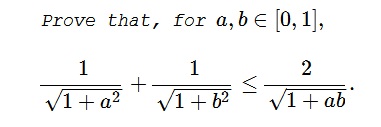The power of substitution II
proving an inequality with two variables
Problem

Solution 1
Let $a=\tan x\,$ and $b=\tan y,\,$ with $\displaystyle 0\le x,y\le\frac{\pi}{4}.\,$ The required inequality becomes
$\displaystyle \cos x+\cos y\le 2\frac{\sqrt{\cos x\cos y}}{\sqrt{\cos (x-y)}},$
or, equivalently,
$\displaystyle (\cos x+\cos y)^2\cos (x-y)\le 4\cos x\cos y.$
Note that $\displaystyle \cos x+\cos y\le2\cos\left(\frac{x+y}{2}\right).\,$ Thus, suffice it to prove that
$\displaystyle \cos^2\left(\frac{x+y}{2}\right)\cos (x-y)\le\cos x\cos y.$
Recollect that $\displaystyle \cos^2\left(\frac{x+y}{2}\right)=\frac{1+\cos (x+y)}{2}\,$ and $\displaystyle \cos x\cos y=\frac{\cos (x-y)+\cos (x+y)}{2},\,$ so that we need to prove
$\cos (x-y)+\cos (x-y)\cos (x+y)\le \cos(x-y)+\cos (x+y),$
which is obvious since $\cos (x+y)\ge 0\,$ and $\cos (x-y)\le 1.$ That completes the proof. Equality holds if $x=y,\,$ i.e., if $a=b.$
Solution 2
Note that
$\displaystyle \frac{1}{1+a^2}+\frac{1}{1+b^2}-\frac{2}{1+ab}=\frac{(ab-1)(a-b)^2}{(a^2+1)(b^2+1)(1+ab)}\le 0,$
because $ab\le 1.\,$ Equality is attained for $a=b.$ It follows that
$\displaystyle \frac{1}{1+a^2}+\frac{1}{1+b^2}\le\frac{2}{1+ab}.$
By the Cauchy-Schwarz inequality,
$\sqrt{(a+a^2)(1+b^2)}\ge 1+ab,$
so that
$\displaystyle \frac{2}{\sqrt{(1+a^2)(1+b^2)}}\le \frac{2}{1+ab},$
and, subsequently,
$\displaystyle \left(\frac{1}{\sqrt{1+a^2}}+\frac{1}{\sqrt{1+b^2}}\right)^2\le \left(\frac{2}{\sqrt{1+ab}}\right)^2,$
or, equivalently,
$\displaystyle \frac{1}{\sqrt{1+a^2}}+\frac{1}{\sqrt{1+b^2}}\le \frac{2}{\sqrt{1+ab}}.$
Equality is attained for $a=b=1\,$ or $a=b=0.$
Solution 3
Let $\displaystyle f(x)=\sqrt{1+e^{2x}},\,$ $x\le 0.\,$ $\displaystyle f'(x)=e^{2x}\left(1+e^{2x}\right)^{-\frac{3}{2}},$
$\displaystyle \begin{align} f''(x) &= -2e^{2x}\left(1+e^{2x}\right)^{-\frac{3}{2}}+3e^{4x}\left(1+e^{2x}\right)^{-\frac{5}{2}}\\ &=e^{2x}\left(1+e^{2x}\right)^{-\frac{5}{2}}\left[3e^{2x}-2(1+e^{2x})\right]\\ &=e^{2x}\left(1+e^{2x}\right)^{-\frac{5}{2}}(e^{2x}-2)\lt 0, \end{align}$
since $x\lt 0.\,$ Thus, $f(x)\,$ is concave and, according to Jensen's inequality, $\displaystyle f(x)+f(y)\le 2f\left(\frac{x+y}{2}\right),\,$ or
$\displaystyle (1+e^{2x})^{-\frac{1}{2}}+(1+e^{2y})^{-\frac{1}{2}}\le 2(1+e^{x+y})^{-\frac{1}{2}}.$
Substituting $e^x=a\,$ and $a^y=b\,$ gives $\displaystyle (1+a^2)^{-\frac{1}{2}}+(1+b^2)^{-\frac{1}{2}}\le 2(1+ab)^{-\frac{1}{2}},\,$ which is
$\displaystyle\frac{1}{\sqrt{1+a^2}}+\frac{1}{\sqrt{1+b^2}}\le\frac{2}{\sqrt{1+ab}}.$
Acknowledgment
Leo Giugiuc has kindly posted a problem from the artofproblemsolving forum at the CutTheKnotMath facebook page, along with a beautiful and instructive solution (Solution 1). No less instructive was the purely algebraic solution (Solution 2) by Imad Zak, while Marian Dinca has employed a different kind of substitution (Solution 3).
Inequalities in Two Variables
- An Inequality with Just Two Variable $\left(\displaystyle\left(\frac{2ab}{a+b}+\sqrt{\frac{a^2+b^2}{2}}\right)\left(\frac{a+b}{2ab} + \sqrt{\frac{2}{a^2+b^2}}\right) \le \frac{(a+b)^2}{ab}\right)$
- An Inequality with Just Two Variable II $\left(\displaystyle\small{\left(\frac{2ab}{a+b}+\sqrt{ab}+\frac{a+b}{2}\right)\left(\frac{a+b}{2ab} + \frac{1}{\sqrt{ab}}+\frac{2}{a+b}\right) \le 5 +2 \left(\frac{a}{b}+\frac{b}{a}\right)}\right).$
- An Inequality with Just Two Variable III $\left(\displaystyle\frac{a}{b\sqrt{2}}+\frac{b\sqrt{2}}{a}+2\left(\frac{\sqrt{a^2+b^2}}{b}+\frac{b}{a^2+b^2}\right)\ge \frac{9\sqrt{2}}{2}\right)$
- An Inequality with Just Two Variables IV $\left(\displaystyle\frac{a+2}{a^2+a+1}+\frac{b+2}{b^2+b+1}\ge \frac{ab+2}{(ab)^2+ab+1}+1\right)$
- An Inequality with Just Two Variables V $\left(\displaystyle \left(\ln\left(\frac{1}{2a}+\frac{1}{2b}\right)\right)^{a+b}\ge \left(\ln\frac{1}{a}\right)^b\left(\ln\frac{1}{b}\right)^a\right)$
- An Inequality with Just Two Variables VI $\left(|x-y|(x+1)(y+1)\le 2\right)$
- An Inequality with Just Two Variable VII $\left(\displaystyle (x^3+y^3)^3(x^2-xy+y^2)\ge x^2y^2\sqrt{xy}(x^2+y^2)^3\right)$
- An Inequality with Just Two Variable VIII $\left(\displaystyle \frac{a^2}{b+2}+\frac{b^3}{a+2}+(2-a)b^2\le 12\right)$
- The power of substitution III: proving an inequality with two variables
- Simple Yet Uncommon Inequalities with Absolute Value $\left((|x|-|y|)^2\le |x^2-y^2|,\,|\sqrt{|x|}-\sqrt{|y|}|\le\sqrt{|x-y|}\right)$
- An Inequality with Just Two Variable And an Integer $\small{\left(\displaystyle \Bigr(\frac{a}{b^n}+\frac{b}{a^n}\Bigr)\Bigr(\frac{a^n}{b}+\frac{b^n}{a}\Bigr)\Bigr(\frac{a^n}{b^n}+\frac{b}{a}\Bigr)\Bigr(\frac{b^n}{a^n}+\frac{a}{b}\Bigr)\geq 8\left(\sqrt{\displaystyle\left(\frac{a}{b}\right)^{n-1}}+\sqrt{\displaystyle\left(\frac{b}{a}\right)^{n-1}}\right)\right)}$
- An Inequality with Exponents $\left(\displaystyle b^b\cdot e^{a+\frac{1}{a}}\ge 2e^b\right)$
- Problem 790 from Pentagon: an Inequality in Two Variables $\left(\displaystyle\ln \left|\left(\frac{2+\sin 2b}{2+\sin 2a}\right)\right|\leq \frac{2\sqrt{3}}{3}(b-a)\right)$
- An Inequality with Two Variables from Awesome Math $\left(\displaystyle \frac{6ab-b^2}{8a^2+b^2}\lt\sqrt{\frac{a}{b}}\right)$
|Contact| |Front page| |Contents| |Algebra|
Copyright © 1996-2018 Alexander Bogomolny
73754321
